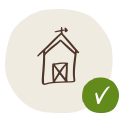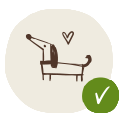Return of empty packaging and management of empty packaging accounts
It is generally agreed that pallets are exchanged at the sender and at the recipient. This service is included in the freight price.
The carrier is itself responsible for non-exchanged empties, separate pick-ups, or costs for returning the loading equipment.
bosch Tiernahrung GmbH & Co.KG is equipped with fully automated systems for production and warehousing. Due to the high degree of automation, we need pallets that are dry, machine-accessible, suitable for materials handling technology and capable of handling high bays (known in Germany as "MFH"-compatible).
All pallets delivered to bosch Tiernahrung are always checked by a fully automated testing station for the above-mentioned quality. The empties are also checked for moisture and strictly no wet empties are accepted. Non-usable (non-exchangeable) pallets are sorted out manually in advance.
Checking is usually carried out at a later date in order to keep downtime as low as possible.The driver will only be notified in advance of receipt of the unchecked empties and the driver must countersign that he agrees to a later inspection. Only the pallet note from bosch Tiernahrung will be accepted as proof and no other documents will be acknowledged (CMR, delivery note...). The test report will then be submitted as soon as possible.
If the driver insists on being present during the test, a corresponding waiting period must be expected. Any resulting consequential costs (demurrage, dead freight...) are to be borne solely by the carrier.
Return shipments of empties that exceed 200 units (euros/DDP) must be registered with bosch Tiernahrung at least two working days in advance.
Pallets that have been discarded (not "MFH" compatible) are recorded to a separate empties account from the exchangeable pallets. There are four ways to balance the account with the discarded pallets.
1. Collect the discarded pallets; prior arrangement with bosch Tiernahrung is required at least one working day in advance. The pallets can only be collected up to 4 weeks after delivery.
2. bosch Tiernahrung acquires the carrier's discarded pallets by paying € 1.75 per pallet (Euro/DDP). The balance of the empties account is then adjusted.
3. The discarded pallets are reposted as exchangeable pallets using the ratio of 2:1.
4. bosch Tiernahrung charges the carrier a € 1.25 conversion fee for each discarded pallet (Euro/DDP). The stock of the empties account for discarded pallets is accordingly transferred to the empties account for exchangeable pallets. Return of empty packaging and management of empty packaging accounts.












